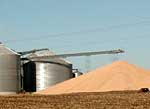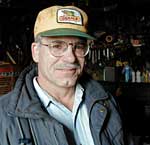Farmers end tough year
By Tim Post
Minnesota Public Radio
November 8, 2001
|
| RealAudio |
Most Minnesota farmers are finished with this year's harvest. But it was a tough year for some farmers. A wet spring forced many to plant late in the season, and in the summer, there was not enough rain in some areas. That means crop yields will run below average this fall. That's bad news from farmers who are facing low prices again this year.
| |
|
|
|
||
For many Minnesota farmers this year, almost everything that could go wrong, did go wrong. Farmers faced a tough winter, a wet spring and then a dry summer.
"It was kind of a year of extremes," says Mike Hunst with the Agricultural Statistics Service. "Farmers were extremely late getting crops in, we had an extremely large amount of rain early in the growing season, and then it got extremely dry for a while." Hunst says farmers did get a break when it came to harvest time, because no rain or major storms hampered their work. But the effects of bad weather earlier in the year are showing up now.
The Minnesota Agriculture Department estimates the yield on soybeans will be down by 10 percent compared to the five-year statewide average. And corn production could dip 20 percent. But the real problems are in parts of west central and central Minnesota. For example, in Benton County, nearly one-quarter of the farmland was never planted this spring. It was just too wet.
Agriculture officials in the county say their corn and soybean harvest will be half of what it was last year. That means farmers will have less to offer co-ops and processors this fall. But that's not expected to hinder operations at Minnesota agricultural processing plants.
A truck driver dumps a load of soybeans at the AGP soybean processing plant in Dawson. The 26 tons of soybeans quickly disappear into a grate in the cement floor. The whole process takes only a few minutes. Scott Quick, AGP's merchandising manager looks on. "We've experienced - in the last few years - some tremendous crops, both due to the weather conditions and just expanded acreage."
Quick admits this was a less than perfect year for soybeans. He says people are used to record-breaking harvests, so this year's harvest seems poor in comparison.
| |
|
|
|
||
"Yields in our draw area are definitely down," says Quick. "They're down for the entire state of Minnesota as well as some other areas of the western corn belt. But it should be no problem with the total supply for the year."
AGP gets soybeans from farmers in South Dakota and North Dakota, as well as Minnesota. So a bad harvest in Minnesota won't necessarily affect AGP. But of course, it hurts Minnesota farmers.
Farmers still receive very low prices for their crops. They say they can barely make a living, even when they pull in a record harvest. So a bad harvest is especially tough.
Bernie Zinda farms 1,100 acres of corn, soybeans and wheat in Swift County. Zinda says his harvest was down by a few bushels an acre this year. The wet spring held his crops back, but he thought it was going to be much worse.
"I was pretty satisfied, and we had a nice fall for harvest. We had good weather," says Zinda. "We got started on the soybean harvest, and we just kept going and going and going. We didn't have hardly anything for weather delays, so very nice harvest season. But it's still nice to be done."
Zinda is done with his harvest, and now he's headed back into the field with his pale green Steiger tractor. He's going to till the crop residue into the soil to prepare for 2002.
Zinda expects next year will be one that pushes crop production back in record territory. But he also expects another year of lousy prices.
"But who knows, something might happen and we'll have a great market. It's got to happen someday - a good market and a good price," says Zinda. "I know a lot of guys that have said that's never happened to them, so I hope it happens to me once. I'd like to have a good year of production and good price - just to say that it happened once."
Zinda says he can make it through the low prices because of government farm programs and low loan rates. He hopes lawmakers in Washington will help farmers a bit more when they rework the farm bill. Zinda says he likes the idea of paying farmers to leave more land idle.
Next year record crops are likely to return, but Bernie Zinda and other Minnesota farmers may have to wait for record prices.
More from MPR

